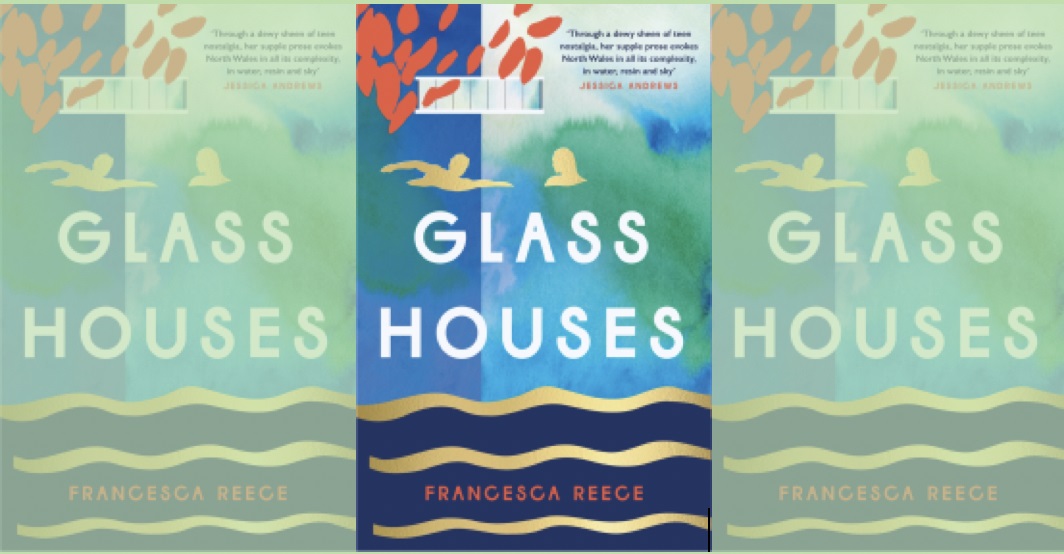Book review: Glass Houses by Francesca Reece

Cath Barton
Midway through this story, the central characters Gethin and Olwen come across an old mine deep in a forest: ‘She was repelled, and yet there was something compelling about being on the threshold of an unimaginable recent past.
She thought about the R. S. Thomas poem they’d studied at school, about Wales being a country with no future and no present, only past.’ Whether we can escape the shadows of the past is a question that Francesca Reece, the north Walian author of Glass Houses, certainly asks us to consider.
Gethin and Olwen meet as teenagers in the 1990s, across a divide of class and national identity. He is from a Welsh farming family; she, although she has lived all her life in Llanelgan, the same (fictitious) small Welsh town as Gethin, is English, and ‘posh’.
Central to their story is Tŷ Gwydr, a house built of glass and wood overlooking a lake, which belongs to an absentee English architect, and is looked after by Gethin’s mother. For Gethin it quickly becomes a place where he can imagine a different life, a place where he can picture the father he doesn’t know and, later, a place he takes Olwen and with which, for him, the idea of her becomes inextricably associated. They go their separate ways but years later, when the house is sold, it pulls the two of them back together.
Politics
Add to this picture Gethin’s uncle Iestyn and the way he is caught up in Welsh politics around 1980, when the nationalist group Meibion Glyndŵr comes to prominence and the police are looking for informers in their hunt for those responsible for attacks on English-owned holiday homes. What happens to him at that time – and who he considers to be responsible – taints his life with bitterness. He becomes a sad drunk, but one who is also capable of threatening behaviour when his sense of shame turns to anger.
Pace
The push and pull of the pace of Glass Houses between present and past is skillfully achieved, and mention in news reports of real events such as the Lehman Brothers collapse in 2008 and the Brexit decision in 2016 serve as solid markers of the time frame.
If the descriptions of Iestyn’s 1980 encounters with the police feel a little stereotypical, and Detective Clive Cummings a bit cartoonish, perhaps it is so because of the contrast with Reece’s powerful descriptions of all things sensual, such as here at a moment of conflict between Olwen and Gethin: ‘He waited there for another handful of seconds whilst the air between them snapped like kindling spitting embers.’
One of the strengths of this novel, that makes the story sing and stay with the reader, is its very strong sense of place, and Reece clearly calls on her intimate knowledge of both the landscape of North Wales – ‘a place of vertiginous elevation and tangible magic’ – and the nature of its communities; if chapel is not central to this story, pub life certainly is, with all its jostle and noise and stickiness!
Physicality
Gethin does a chainsaw course and works in the woods. He is bound by – indeed defined by – his physicality, and that is both his strength and his weakness. Olwen, in contrast, appears to be supremely self-confident, but she too has her vulnerabilities; she achieves early success as an experimental filmmaker but is knocked by a sniping review, as a result of which she changes tack to work on an idea for a film that combines Welsh folklore and the Meibion Glyndŵr. This is a somewhat contrived plot device to bring Olwen back from London to Tŷ Gwydr and have her attempt to make contact with Gethin’s uncle Iestyn.
There is however another intriguing aspect (whether intended by the author or not) to the folklore connection, which is that the story of Gethin and Olwen can itself be seen as a partial retelling of one of the stories from the Mabinogion, that of Culhwch, a boy raised by a swineherd, who becomes infatuated with Olwen, the daughter of the king of giants.
The tale of Culhwch and Olwen is an Arthurian romance; once he has completed a series of punishing tasks the boy is allowed to marry the girl. Glass Houses tells a somewhat different story of star-crossed lovers, one which contains within the twists and turns of its plot a beautifully-nuanced examination of the emotional fragility of its central characters, who find that they cannot ignore either past or present in their quest for a future together.
Glass Houses by Francesca Reece is published by Tinder Press and is available from all good bookshops.
Support our Nation today
For the price of a cup of coffee a month you can help us create an independent, not-for-profit, national news service for the people of Wales, by the people of Wales.






